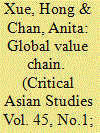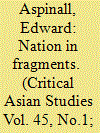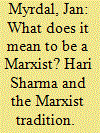|
|
|
Sort Order |
|
|
|
Items / Page
|
|
|
|
|
|
|
| Srl | Item |
| 1 |
ID:
119706


|
|
|
|
|
| Publication |
2013.
|
| Summary/Abstract |
Desiring to "engender" the written history of the Communist Party of India (CPI) and the movements it led or initiated, the author looks at the first generation of middle-class women who became communists in colonial Bengal in the period 1939 to 1948. Judging that much of the available printed and archival source material inadequately describes the role of women in the CPI, the author interviewed many of the surviving women CPI recruits and studied their printed memoirs. She examines in particular two organizations that were established in the late 1930s and early 1940s, namely, the Chhatri Sangha (Girl Students' Association) and the Mahila Atma Raksha Samity (Women's Self-Defense Association). The author contends that the recruiting and mobilizing strategies of the CPI-while focused primarily on class-also had important consequences for gender relations: many middle-class women found themselves transgressing the narrowly constructed norms of propriety and mixing with women of lower classes and working in public spaces together with men in ways the existing nationalist feminisms/nationalist conceptions of women's public activism had not made available. The author concludes that these revelations show the need to rethink stereotypes about the communist women, stereotypes built from the experiences of new generations of feminists in the 1960s and 1970s, but which seem not to have been as rigidly created or enforced in the 1940s as they were later on.
|
|
|
|
|
|
|
|
|
|
|
|
|
|
|
|
| 2 |
ID:
119705


|
|
|
|
|
| Publication |
2013.
|
| Summary/Abstract |
The global value chain concept has become one of the most influential frameworks used in the study of globalization. The paradigm, however, is deficient in explicating the exploitative nature of global value chain governance. Based on a study of soccer ball production in China and Pakistan, this article analyzes global production from three perspectives: the role of the state in shaping the host countries' mode of production and legal framework, the issue of how surplus value is created and distributed, and the use of child labor or prison labor to remain competitive in the chain. The article shows, in the case of Pakistan, how a country using a lower-labor-costs strategy to retain a place in a global value chain allows its workers to be exploited and pauperizes its people.
|
|
|
|
|
|
|
|
|
|
|
|
|
|
|
|
| 3 |
ID:
119704


|
|
|
|
|
| Publication |
2013.
|
| Summary/Abstract |
Scholars of Indonesia are still searching for ways to characterize the ordering principles of the new post-Suharto politics. In the 1950s and 1960s, Clifford Geertz's notion of aliran (stream) politics captured central features of Indonesian political life. In the 1970s and 1980s, the state took center stage, with scholars seeing the New Order state as standing above society, depoliticizing and reordering it. Since reform began in 1998, these analyses are clearly no longer adequate, but scholars have yet to find persuasive alternatives. This article offers one attempt to diagnose the fundamentals of political organization in contemporary Indonesia. It starts by emphasizing the organizational fragmentation that characterizes much contemporary political life. It seeks the origins of this fragmentation in two sources: the ubiquity of patronage distribution as a means of cementing political affiliations and the broader neoliberal model of economic, social, and cultural life in which patronage distribution is increasingly embedded. These two forces are often portrayed as being incompatible, but in practice they are frequently intertwined. This argument is first substantiated by reference to the project (Indonesian: proyek), a mechanism for distributing economic resources that is pervasive in Indonesia. The proyek formally adheres to the expectations of transparency and competition associated with neoliberalism, but is also a major source of patronage. Proyek-hunting drives much of the fragmentation in contemporary Indonesian political and social organization. The argument is then illustrated with examples drawn from four spheres: state structures, political parties, non-governmental organizations and Islamic politics.
|
|
|
|
|
|
|
|
|
|
|
|
|
|
|
|
| 4 |
ID:
119703


|
|
|
|
|
| Publication |
2013.
|
| Summary/Abstract |
The Chinese Communist Party has been suspicious of people engaged in commercial activity on the streets ever since it took over the country in 1949, but the reasons for this have shifted in a paradoxical way over the decades. In the years when Mao Zedong ruled the nation according to his understandings and beliefs about socialist values and for several years after his death the suspicion in the main concerned the capitalist practices that business entails-profit making, inequalities, price-consciousness, class differentiation. Except for a few short intervals, doing non-state trade or providing private services was banned. In the first few decades after 1980, marketing outside was treated more leniently, although paying fees and purchasing licenses were still required in order to avoid harassment, and peasant migrants faced challenges. But once millions of people were laid off after 1995, the Party hoped to enable them to make a living, and also to prevent them from protesting, so it gave them special leeway to work outside from stalls and even directly on the pavement. After the mid 2000s, however, the indigent-the majority of whom were probably once members of the ideologically sacrosanct proletariat-have, ironically (in light of the values of the past) been discouraged from appearing on city streets to make money. Thus now that capitalist activity is common, the impoverished are considered to damage the city appearance, so that instead of capitalism being banned, it is the interests just of large-scale moneymakers that are to be served.
|
|
|
|
|
|
|
|
|
|
|
|
|
|
|
|
| 5 |
ID:
119707


|
|
|
|
|
| Publication |
2013.
|
| Summary/Abstract |
The Hari Sharma Memorial Lecture series was instituted by the Dr. Hari Sharma Foundation for South Asian Advancement in memory of Hari Sharma, who left his estate to the Foundation when he passed away in 2010. The purpose of the series is to present scholars and writers who have made a significant contribution to the struggle for emancipation in South Asia. The first lecture in this series was presented by Jan Myrdal, one of the most prominent Swedish writers, a life-long Marxist, and for many years a friend of Hari Sharma. Myrdal wrote his first book on India, India Waits, after his visit to the "disturbed areas" of Andhra as a guest of C.P. Reddy in 1980. He visited Dandakaranya in 2010 at the invitation of the Communist Party of India (Maoist) and wrote about his conversation with the leadership of the party in Red Star over India: Impressions, Reflections and Discussions When the Wretched of the Earth Are Rising (Kolkata, 2012). Following his speaking tour after the book's release in Kolkata, Myrdal was banned from visiting India by the Government of India.
|
|
|
|
|
|
|
|
|
|
|
|
|
|
|
|
|
|
|
|
|